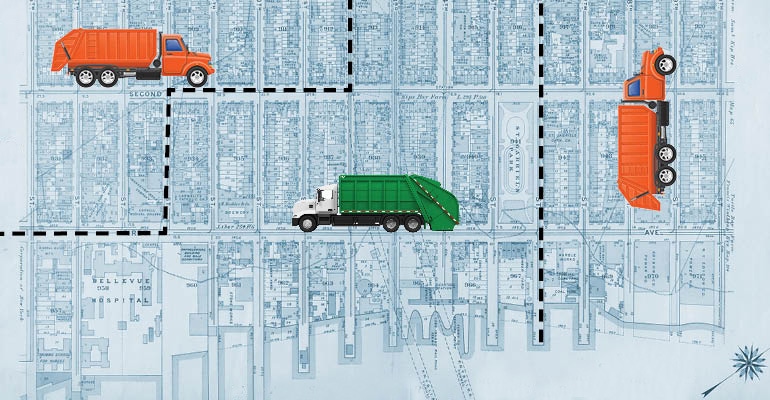Along with the study of improvement options, the Long Beach Council also approved a request that the city manager issue a five-year notification to the city-approved private haulers.

From New York City to Los Angeles, Portland and Seattle, cities across the country are looking at exclusive franchise zones to modernize commercial collection waste hauling systems.
Those favoring franchise zoning systems claim the public sector has more control over the waste management collection process. Critics say franchise zones lead to monopolies that kill the open-market system taking away businesses’ ability to choose their own haulers, and lead to increased costs and decreased service for customers.
Last week, the Long Beach (Calif.) City Council unanimously voted to conduct a study exploring the option to improve the private commercial waste hauling system in Long Beach. The emphasis is on limiting inefficient and overlapping truck routes; environment, health and safety impacts; wear and tear on streets and alleys; and establishing a pipeline for local jobs and training.
With a franchise zone collection system, municipalities establish zones, which are assigned areas of collection with exclusive hauling contracts. Communities often choose haulers to through a bidding process to serve the designated zones, where haulers provide the municipalities with collection services details and options. If long-term contracts are established between municipalities and haulers, the haulers have the incentive to make the necessary infrastructure investments that are needed to achieve high diversion rates.
David Biderman, SWANA CEO and executive director, is positive about the Long Beach plan.
“SWANA supports municipal efforts that reduce inefficiencies, traffic and emissions, and have the potential to improve worker and community safety,” Biderman says. “We are pleased that the City of Long Beach will be carefully evaluating whether commercial waste collection franchises make sense for city businesses.”
Other organizations, including Don’t Waste Long Beach, a coalition of environmental, community, food rescue, and workers’ rights organizations, support changes to the commercial hauler system and for franchise zones.
Don’t Waste Long Beach advocated for an exclusive franchise system as the best way to achieve zero waste. The proponents say this type of system would allow the city to hold waste hauling companies accountable by requiring high safety and environmental standards, efficient routing, quality service, guaranteed access to recycling, and eventually green waste collection.
“We’re happy that our city leaders are working to establish region-wide standards in the commercial and multi-family sector,” Robert Nothoff, director of Don’t Waste Long Beach, said in a press release. “In order to be the green city we aspire to be, we need to transform our system here in Long Beach by increasing access to recycling for all city residents and businesses, and establishing efficient truck routing which will reduce air and noise pollution.”
Along with the study of improvement options, the Long Beach Council also approved a request that the city manager issue a five-year notification to the city-approved private haulers concerning the study of options and possible changes to the private commercial waste hauling system.
But the plan has faces some opposition.
We oppose the city’s move to issue a five-year notice,” says Ron Saldana, executive director of the California Waste and Recycling Association. “We support the city in terms of reaching zero waste and initiating programs to do that. I think they already have programs in place.”
Saldana says he feels it is ill-conceived for those who sponsored the commercial exclusive franchise system in Los Angeles to attempt to also bring that system to Long Beach.
“There’s a lot of good things to say about it in terms of jobs and cleaning up the environment, but we felt in looking at Long Beach that Long Beach programs were already well ahead of the curve,” he says. “Their diversion rate is 74 percent. When we get to 75 percent, if that’s the goal by 2020, then Long Beach is already there. They have new programs including organic collection programs on the drawing board, so I think that for Long Beach to compare themselves to LA I think they are just two different cities in two different situations.”
In the past five years, California has adopted multiple regulations regarding commercial waste, including a 75 percent state-wide recycling goal by 2020, mandatory recycling for businesses, mandatory commercial organics collection and 75 percent diversion rate for organics by 2025. The city staff of Long Beach, says Saldana, is doing an excellent job and always is a step ahead of these types of regulations.
However, the five-year notice, he says, freezes things into place and haulers will be hesitant to invest in infrastructure and new equipment when in five years they may not even be able to work in the city. The association recommended that the city form a task force to get stakeholder input.
Rate hikes and rent hikes, possibly as much as doubling of rates if they go with a fixed rate like in Los Angeles, Saldana says. Some may not have understood that as a possibility.
Better Housing for Long Beach, a landlord-affiliated group, in a statement on its Facebook page said, “The right to select your own trash hauler is in jeopardy.”
Suggesting the franchise zones implemented in other cities have created “a trash monopoly where monthly cost for trash pickup rose 300 percent in 12 months.”
This is not good for affordable housing, renters, condo owners, small business owners or property owners. Long Beach community members will bear this price increase burden for years to come."
About the Author(s)
You May Also Like


